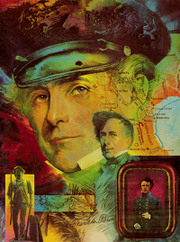The following is a work of fiction. Here is the Table of Contents, which is updated as new chapters are written.
It is the third in a series of sci-fi novels of the type known as
alternate history. What’s different is that this series takes place in
our time, with characters familiar in your real life.
The first book in the series, The Chinese Century, was written late 2004. Its table of contents is here. The second, The American Diaspora, was written in 2005. The table of contents for that book is here.
The final call to prayer had come and gone. The city waited for what might come.
The night shift guards had settled in at their posts, and the streets of Najaf were quiet. Only the pop-pop-pop of rifle fire and the rat-tat-tat of an AK punctuated the quiet. The people of the city had long-ago grown used to them.
An explosion might wake them, if it were loud enough. But nothing less would do.
There was only one unusual sound, on a side street a mile from the Grand Mosque. It was the hum of an air conditioning unit. It protruded from a second-story window, and the observer had noted on the the night before that it didn’t go off. This was unusual in a city where electricity ran for maybe 2-3 hours per day on average, and where gas to run a generator was tightly rationed.
There were two guards downstairs, two more upstairs. The normal route to the target would be to either take out the first two, then rush the stair, or to simply bomb the place, waking the neighbors. There would be collateral damage, and it would be suicide for the attacker. Not that there was anything unusual in that. But these attackers weren’t buying.
The target’s full security services were ready in any case with extra guards across the street, hidden behind thick doors.
The best route was the simplest, but it required patience, and money. This was infiltration. For months now new, competent recruits had been coming into the target’s security team. They had already foiled several assassination attempts and had gained the target’s personal trust. The target didn’t have to know where the attempts were coming from.
Of the four men on guard that night, three were now new and the fourth, at the top of the stairs, was easy to take out with a silencer. Of the men across the street there were divided loyalties, and the added punctuation of money to do nothing.
The two men downstairs listened closely for that sound, that tiny pop, then turned slowly and pounded up the stairs when they heard it. Across the street the attacker’s men worked calmly to convince the others nothing was happening. The three remaining guards then forced the door, took out the target and all those with him, still using silencers, then vanished into the night.
The next day would be louder than the night.
The murder of Moqtada al Sadr would have a powerful effect throughout Iraq. But, Erik Prince felt certain, it would ultimately be a salutory one. By striking at the srong men on all sides, the weak government of Nouri al-Maliki would appear stronger in turn. By striking at the wise men on all sides, he was certain, the government would seem wiser. And this would eventually lead to negotiation, once all sides saw they were losing.
The decaptitation policy of Blackwater DCM violated every rule of warfare, and if the factions became aware of who was behind it, their revenge would be total. No government could engage in such work. Even the CIA was too dumb for such work. “It takes iron balls,” Prince said, “and that’s why we get the big money.”
"Just remember the goal," the man who was paying said quietly, over pork loin and sparkling water. "What we want is balance. We want everyone to want the oil flowing, to keep the arms flowing. If anyone wins, we lose. And we want to know what will happen, before it happens, so we can take advantage of the resulting volatility."
Prince smiled. "And the capital we’re using to take advantage belongs to the same people we’re killing."
"All these hedge funds, these private equity geniuses. They use scale. They use laws. They use knowledge. They use computers. Add a little foreshadowing and you start to get the picture." Cheney smiled.
"What is the picture?" Prince asked.
"It’s coming into focus, and it’s all one. Money, arms, and power are all fungible goods, one easily exchanged for the others. But, having had power, I’ve concluded at the end of the day it’s money which is the trump card. All other assets lead to cash, and the man who has the most cash has the most freedom of action."
"What’s the aim, then?"
"Just that. Freedom of action. Control. A King may want to rule everything, but the wealthiest can even buy a King, and their Kingdom. That’s the world my grandson will grow up in, a world he can own an
"And what will he do with it?" Prince asked. It was the one question Dick Cheney had no answer for, save a grunt and a shrug.











